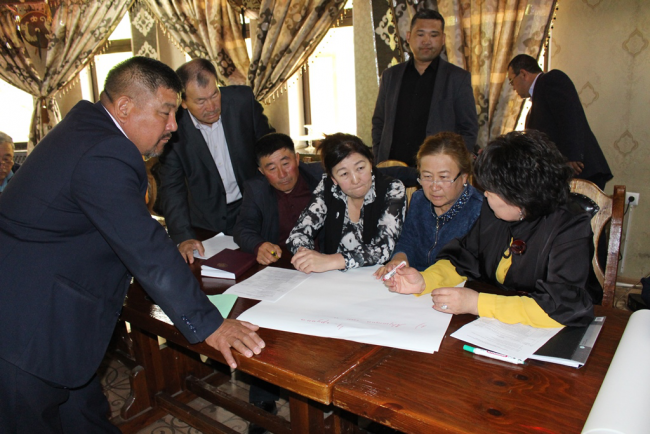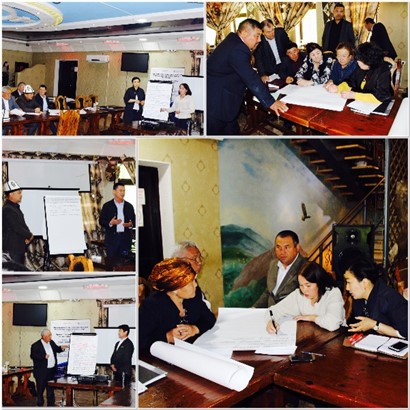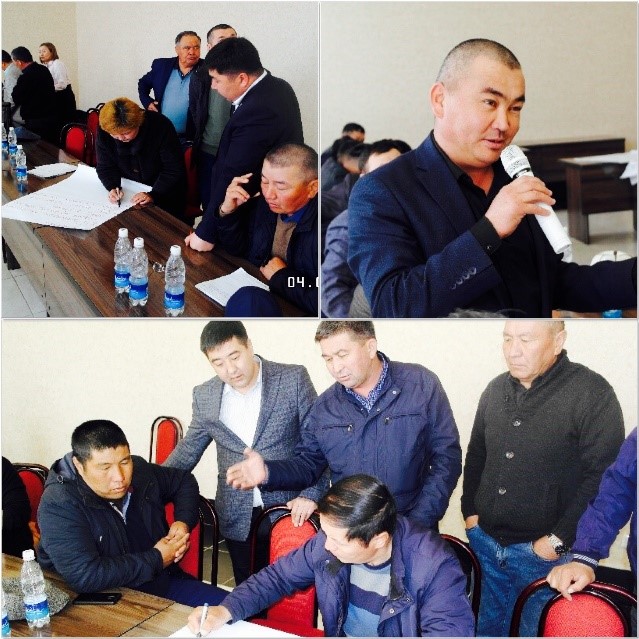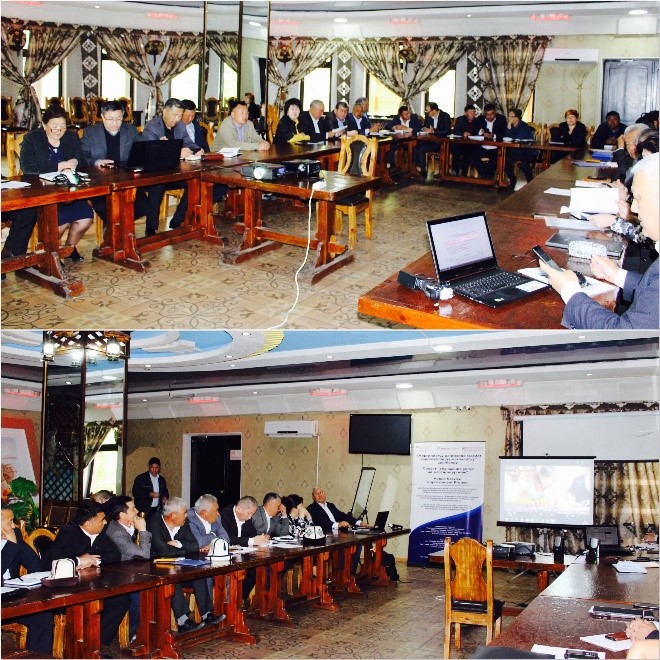PSI finalized the 1st phase of its activities in Jalal-Abad and Issyk-Kul oblasts

On April 3 and 11, 2019, in the cities of Karakol and Jalal-Abad the regional seminars were conducted on the results of the activities of the 1st phase of the “Public Service Improvement” Project. The seminars were attended by the Heads and the Toragas AK of pilot ayil okmotu in Issyk-Kul and Jalal-Abad oblasts, local consultants, regional project coordinators, as well as the representatives of non-pilot ayil okmotu interested in the development of inter-municipal cooperation. In total 100 people participated in two seminars.
In the Issyk-Kul region, the project worked in 11 municipalities, in the Jalal-Abad region in 19 municipalities.
 At the seminars, the project manager Mambetova Asel made the presentation on the results of the work done in the frames of the project from May 2015 till April 2019. In addition, the participants watched a short video on the project’s activities in both Issyk-Kul and Jalal-Abad oblasts.
At the seminars, the project manager Mambetova Asel made the presentation on the results of the work done in the frames of the project from May 2015 till April 2019. In addition, the participants watched a short video on the project’s activities in both Issyk-Kul and Jalal-Abad oblasts.
In the course of seminars in both regions, the workshops were carried out in small groups to identify the opinions of the participants on the following issues:
What exactly did you get from the Project? What have you learned in the framework of the PSI Project? All respondents marked the great role of the project in gaining experience in developing service improvement plans: a simple and accessible methodology that covers all areas of service improvement activities. The trainings and knowledge on how to calculate tariffs for drinking water and removal of solid waste has greatly helped them.
As a project partner - What were the difficulties in project implementation? At the initial stage they could not be reorganized into managerial decisions to improve the service; nevertheless, the infrastructure was ahead. There were problems in working with the public procurement portal, but thanks to the expert support of the project, all unclear issues were resolved.
What are your specific plans for improving services in your municipalities (what did you do, are doing and what will you do next? Are there any plans to develop services at the local level?). Participants exchanged their experience in improving services, solving problems and difficulties in their municipalities, and also discussed the application of acquired knowledge, skills and methodology derived from the project.
 The head of the B. Mambetov AO I. Kokorov in his presentation noted that due to the methodology on the service development, they were able to implement their plans to provide clean drinking water to residents of Ak-Say village, to launch an information center for residents of aiyl aimak. In order to implement these plans, the funds were raised from other sources. In Accordance with this methodology, plans are being developed for the disposal of solid waste.
The head of the B. Mambetov AO I. Kokorov in his presentation noted that due to the methodology on the service development, they were able to implement their plans to provide clean drinking water to residents of Ak-Say village, to launch an information center for residents of aiyl aimak. In order to implement these plans, the funds were raised from other sources. In Accordance with this methodology, plans are being developed for the disposal of solid waste.
The workshop participants from non-pilot AOs expressed their opinion after discussing all the issues:
The head of the Oktyabrsky AO Akmoldoev Bakyt: “It’s good that non- pilot AOs were invited. We see the great work and achievements that our neighboring AOs have achieved as pilot AOs due to the PSI project. Enhancing the capacity of AA in improving services is a huge contribution of the project into the development of municipalities. In the work of this project I saw an important element - an opportunity to combine the resources of the local self-government, the population and service providers in order to increase the availability, quality and sustainability of the services that are provided in our aiyl aimaks. Our LSG is ready to become a pilot AO in such a project as PSI”.
Bolot Mambetov, the head of the Ton ayil okmotu: “We see the results of the project on Bolot Mambetov ayil okmotu. The training and consultations left their mark. Pilot ayil okmotus as we saw a head taller than other pilots of the Project. Therefore, we are very eager to become a pilot ayil okmotu and learn knowledge and skills, get financial assistance in organizing services in our ayil okmotu."
 The participants of the pilot ayil okmotu marked the great contribution of the project in understanding of the improvement of services, technical support for the project that changed the viewpoints of ayil okmotu employees.
The participants of the pilot ayil okmotu marked the great contribution of the project in understanding of the improvement of services, technical support for the project that changed the viewpoints of ayil okmotu employees.
Askat Kubatov, deputy head of the Jeti-Oguz ayil okmotu” "We express our gratitude to the project for providing financial and methodological assistance in improving the services that were problematic here. Due to the project, we gained knowledge related to the work via the Government Procurement Portal and development of the local service registry. What makes the project different is that it does not leave what it has started and brings it to the end. "
Alisher Tabaldiyev, First Vice-Mayor of Balykchy: “We are very grateful to the project for the assistance in organizing leisure activities in the central park of Balykchy. Due to the project, tariffs for drinking water and household waste were calculated and approved. In addition, the project has carried out a lot of work on training the employees of municipal enterprises on the sustainability of their services. This was a very tangible support from the project. We are very grateful to the people of Switzerland for this help."
At the seminars issues of inter-municipal cooperation to address local issues were also discussed.
The workshop participants expressed their vision of the development of inter-municipal cooperation. The main issues of local importance were highlighted in the following order:
- organization of collection, removal and utilization of household waste;
- drinking water supply to the population;
- ensuring the functioning of municipal roads in settlements;
- ensuring the economic development of the relevant territory, as well as attracting investments and grants;
At the conclusion of the seminars, the participants conveyed their gratitude to the project’s 1-phase results and expressed their interest in further cooperation with the project.

